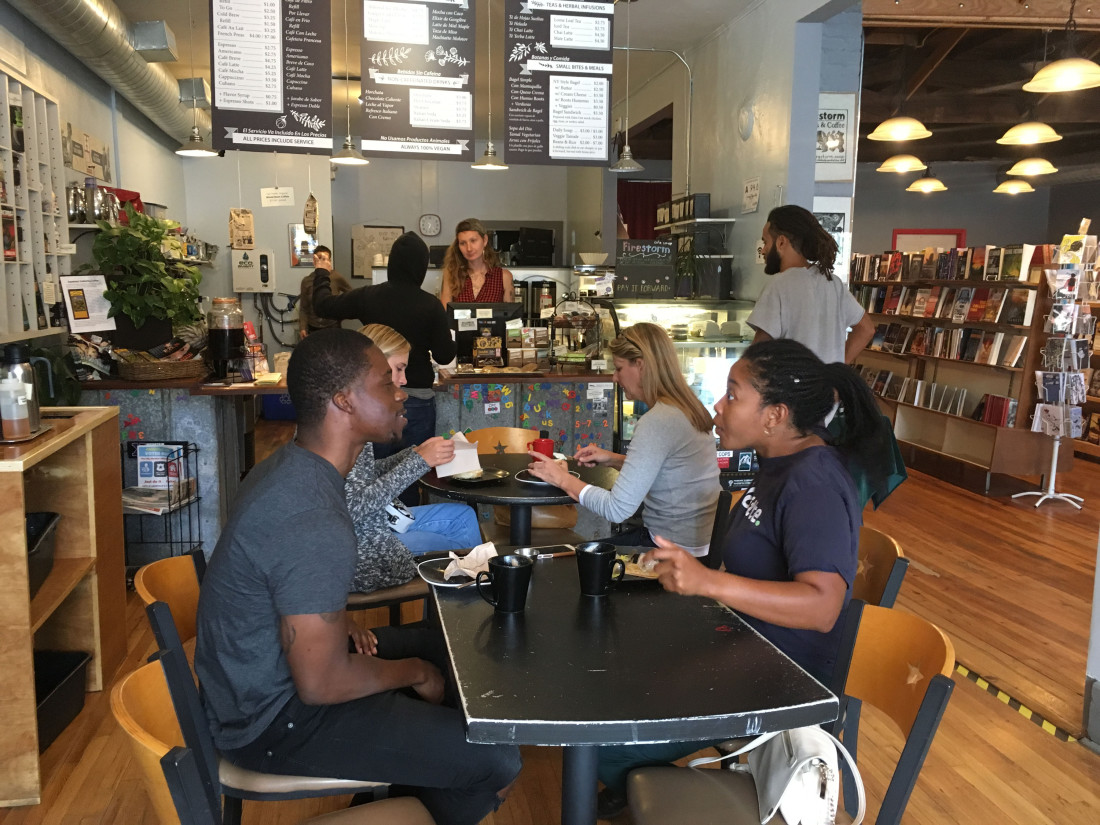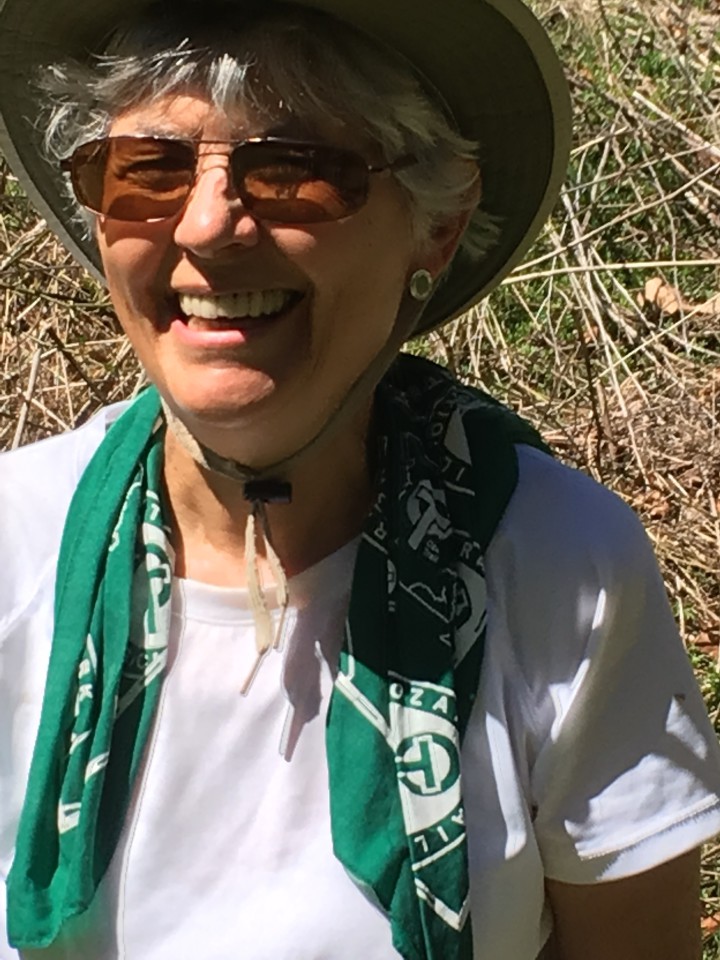BY DANNY BERNSTEIN
When I told a yoga friend that I was moving to West Asheville, she said, “West Asheville? Even I’m too old for West Asheville.” She was probably half my age.
Was she serious? I know several friends way past 50 who live here and love it. I’ve been to restaurants and even a couple of music venues in West Asheville, but what’s it like to live here? The neighborhood gets its share of out-of-town visitors, but I’m a resident now. I’m not going to go back to North Asheville for routine purchases.
First, coffee
At Firestorm Books & Coffee, the atmosphere and ethos remind me of the early 1970s, though they probably wouldn’t be happy to hear this. On its website, Firestorm calls itself a “collectively owned radical bookstore, vegan coffee shop and community event space.” Natasha, the barista, is behind the counter, and I introduce myself. I was never able to get to know my neighborhood coffee shop in North Asheville, mostly because the employees keep changing. But at Firestorm, some are owners. You need to work here for six to nine months to be considered as a potential co-owner.
Coffee is only a dollar, but more expensive if you take it out. This makes sense since, in the store, the coffee is served in reusable mugs. All prices include service, which means no tipping.
Two groups of visitors are eating breakfast this morning. How did they pick this coffee shop with so many choices on Haywood Road?
Mara Kent from Connecticut and her friend Emily from Raleigh are staying at an Airbnb up the road. “This was the closest place,” Mara says.
Greg Orr and Martine Jackson from Richmond, Va., found Firestorm on a vegan food website. “This place got good reviews,” Jackson says.
The bookstore offers serious mainstream books such as White Trash, The Absolutely True Diary of a Part-Time Indian and the latest fiction from Ron Rash. But it’s books like In Search of the Lost Chord: 1967 and the Hippie Idea by Danny Goldberg that you won’t see anyplace else. Or Eating Fire: My Life as a Lesbian Avenger by Kelly Cogswell, about the culture wars. And of course, the classic Pedagogy of the Oppressed by Paulo Freire, first published in 1968. Such a hippie-dippy place — I love it.
Reality sets in
Enough nostalgia. I need food, gas and lodging, as the highways signs used to say. And a mailbox. Lodging is taken care of since I’ve moved into an apartment.
I thought I noticed mailboxes by the American Legion post, but they’re using decommissioned blue boxes as a place to dispose of American flags. I find a functioning one in front of B&B Pharmacy and go into the store. Since so many businesses here tout that they’re local, I want to meet the owners.
Larry Brookshire, the owner and a second-generation pharmacist, is behind the prescription counter.
“My dad started the pharmacy in 1953 with a partner. And we’re still here,” Brookshire says.
The store has the usual greeting cards, cosmetics and candy that all chain pharmacies have. But there’s paraphernalia in B&B Pharmacy that I haven’t seen in years, like Handi Wipes reusable cloths. It also has that rare commodity on Haywood Road —parking.
A little farther down the road, I go into Whist, a neighborhood card and gift store owned by Nora Yockey and Damon Gallagher. Whist has been here for four years. How do these places stay in business? I wonder.
“Well,” Nora says, “We get a lot of support from the community and tourists.” It’s a quick place to get cards and emergency gifts. Again, there’s stuff I’ve not seen in other stores, such as a Doctor Who Coloring Book.
You can’t park in front of most stores on Haywood Road, but that’s true of downtown as well. Still, there’s plenty of parking along this busy street, if you’re willing to walk a few blocks.
Back up the road, I need to assess the Ingles supermarket. I walk around and find everything I’ll need, just fewer choices. The store passes my Wasa crackers test since it has five types of the brand. It’s a good store.
George Stone, the manager, the only one wearing a white shirt and tie, is sticking labels on packages of sliced bread. I asked him about the size of the store.
“We have 32,000 square feet,” he says. “We’re the smallest store in the Asheville area.”
This store doesn’t use a lot of space for magazines and nonfood items such as serving dishes and toiletries, but it seems to have all the staples I may need.
“There’s no way to expand this store, except to go up,” Stone says. “But people love it here because it’s small. Older people don’t want to walk around in a bigger store.”
Stone must know what he’s talking about; he’s been with Ingles for 45 years, 21 in this store. He walks around, talking to his staff and checking out the coffee area — not a Starbucks, but with all the coffee shops on the street, I’m not going to miss that.
Now for gas. The Exxon station on Patton Avenue looks modern and convenient. It offers full service, something I haven’t seen since I left New Jersey, the last state that still outlaws self-service stations. Here, full-service gas is 50 cents higher than self-service. To my amazement, while pumping my own gas, I watch as two 20-something men in a huge van pull up and wait until the station attendant pump their gas.
I go into the store to find out what full service means.
“Yes,” Scotty Rice says. “We check your oil and clean your front and rear windshield.”
Passing Dutch Girl Coin Laundry, I realize that I no longer have a washer and dryer. The laundry looks clean and well-organized with friendly attendants. Can I live without a washer and dryer at home? I’d be able to use the laundry space in the apartment for storing hiking gear instead of putting it in my clothes closet — the time versus space dilemma. Am I taking this downsizing thing too far? Can I simplify this much? I’ll see.
Next time: Goodbye, Beaver Lake. I need to create a 4-mile walk in my new neighborhood.
Danny Bernstein is a hiker, hike leader and outdoor writer.





Welcome to the neighborhood!
West Asheville has gone through many changes over the years. When my father moved from SC with his family in the late 1930’s, he said it was a “jumping place” from one end to the other. It then underwent some decline for many, many years, but now it has become “the place” to be, totally priced out of the hometown folks affordability. This is the “gentrification” of our beloved hometown areas.
If you pick up litter, they will raise the rent!
Very cool Danny! Welcome to the neighborhood.
it is amusing to hear/see all the ‘wonderment’ about a gentrifying area that still has SO many problems…West AVL is the lifelong stepchild of AVL with decades of unaddressed needs such as the
third world street conditions. Can anyone understand why lesser side streets get new paving while busy, cut thru STATE Street has needed upgrades and repaving for at least 20+ years with NO comment from the City ‘people’, even when asked. Looks like the Rainbow Mtn school parents (and staff!) delivering their privately schooled kids would DEMAND better street conditions for their new automobiles, but we hear nothing from them either…
Sorry Ditmore but litter is a sure sign of no local intelligence, aptly demonstrated around here …